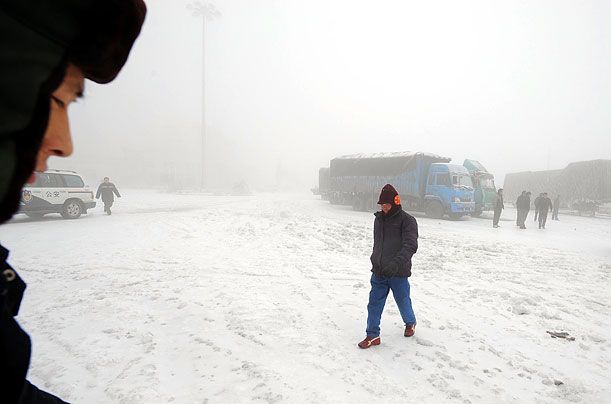Overseas political commentator Liang Jing wrote following essay, thanks to Dr. David Kelly for the translation:
A very important item of information spread around Beijing’s dining and mahjong tables during Spring Festival this year: Premier Wen Jiabao’s macroeconomic policies had taken an emergency change of course, the tight monetary policy was in fact greatly loose, which could allow China’s economy to avoid a man-made a disaster in 2008. It was precisely the recent snow disaster that stimulated Wen Jiabao to make this adjustment. This could not help but make me recite an old Chinese saying, “Fortune gives rise to misfortune, misfortune is what fortune leans on.” Although this disaster brought heavy losses to many people, it may have saved many more, Premier Wen Jiabao in particular.
At the central economic work conference at the end of last year, Premier Wen went hard against popular opinion, and decided to resort to the trump card of monetary tightening—to stop normal business loans. Not always clear to outsiders is the fact that while China claims to be a market economy, it has retained important “Chinese characteristics,” the most important of which is carrying out so-called “macro-control” by means of planned economy techniques. In a typical market economy, economic tightening uses the very simple tool of monetary policy, that is, raising interest rates. Whenever the cost of capital is raised, the level of economic activity immediately falls, just as the temperature of a room natural drops when the air conditioning is switched on. But China’s market economy is different: no matter how high interest rates go, credit is not necessarily controlled, because local governments and state-owned enterprises have never worried about paying their debts; moreover, even when small businesses are willing to pay high interest rates, they may not be able to borrow the money. The Chinese Government has therefore never given up direct control of the balance of loans. Each region has a numerical quota for bank lending.
In recent years, however, due to collusion between local governments and state-owned banks, there has been a serious decline of the central government’s control of lending targets. Local governments and state-owned banks have challenged the authority of the central government, using up their lending targets very early in the year. They know that Wen Jiabao dares not upset the normal economic order by suspending bank lending outright. China’s vested interests have thus become so strong that even the basic economic order has become a hostage for blackmailing the Centre. This is an important reason why Wen Jiabao’s macro-controls have been heating up in recent years.
This time, Premier Wen finally decided he could no longer retreat, as, if he did, the economy would have really big problems. So, since last winter, under Wen’s strict orders, state-owned banks indeed halted large numbers of normal lending operations. The question is, who was injured by this stroke of Wen’s? It was China’s most competitive, but least powerful enterprises. These firms, China’s biggest employers, and the government’s main taxpayers, were the first victims of Wen Jiabao’s macroeconomic regulation and control. Meanwhile, the monopolistic big SOEs and local governments had long before set aside ample funds, and could sort things out among themselves and avoid Wen’s controls.
Wen’s macro-regulation and control thus brought about what he least wanted to see: economic activity directly related to the interests of the people was hit hard, SMEs were closed, and large numbers of workers were unemployed. Of course, Wen’s price controls and new labour laws take some of the credit for this. The bank lending halt was such a severe blow to the normal economy that many peasants found it hard to sell their grain—because the grain merchants couldn’t get loans.
Premier Wen was warned by many people that the economy about to run aground. He argued however that these pressures were all a test of his individual will, and he decided to tough it out, and even when the US Federal Reserve sharply lowered its interest rates, he remained unflinching, even though everyone could see that that it was seriously risky for China to continue tightening.
The heavy snow sweeping over more than half of China frightened Wen Jiabao. He finally realized that his austerity, coupled with the heavy snow, could lead to serious, irreparable consequences.
Thanks to his emergency change of course, after the Spring Festival, China’s currency sluicegates will be opened, businesses will be able to make normal loans, and the stock market will be rekindled. The big snow seems to have saved not only the economy and the Beijing Olympic Games—Wen himself has got off the hook.
Will Heaven above help Premier Wen Jiabao? Will it keep him from befuddlement by China’s game of interests, and casting irreparable errors? For the sake of China’s poor, maybe we really should be praying for him. 






